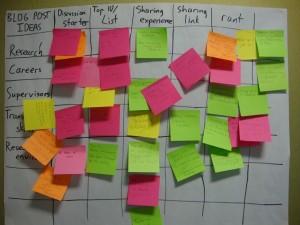A few days ago I was talking to someone about my work. They know me fairly well, so it came as a shock when they said:
“You don’t use your maths any more, do you?”
It really surprised me. They don’t see me every day, so how could they know what I do or don’t do?
I don’t follow the #postac hashtag a lot on Twitter, but I follow a few people who are involved and I wonder if this is a common thing if you finish a PhD/post-doc and then go on to do something outside of academia?
I suppose I felt a little judged as well. Which, on reflection, is odd! I’ve been doing what I do now for nearly seven years. I’ve been doing this longer than my PhD. I couldn’t do this without my PhD – my PhD was like start-up capital for this business. And not just in terms of experience with the area that I work in, important as that is, but in the intellectual capital that I accrued as well.
Some of that is totally maths-related. I analyse problems and make some decisions very quickly because I have a brain that is keyed up to look at things in a certain way. I look for certain types of information about a situation, because my experience – in maths – tells me what things are important to look for.
I guess… I guess I felt like perhaps I wasn’t being seen for something that I am. I’m not a mathematician, I don’t think, not any more. But I do use those tools, that mindset a lot. I’m sure I always will. I love maths, and I love solving problems with maths.
I’m happy using what I’ve learned, happy to be an a-math-teur. 🙂
Thanks for reading!
Nathan (@DrRyder and @VivaSurvivors)

